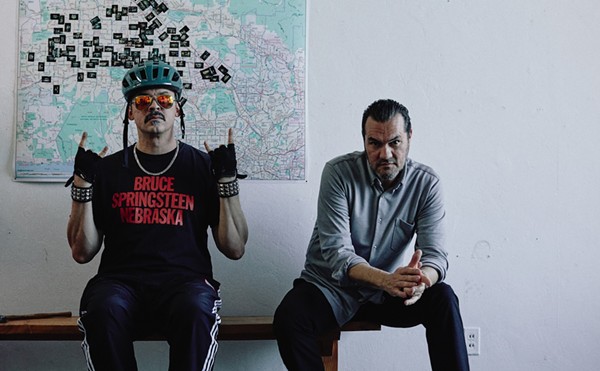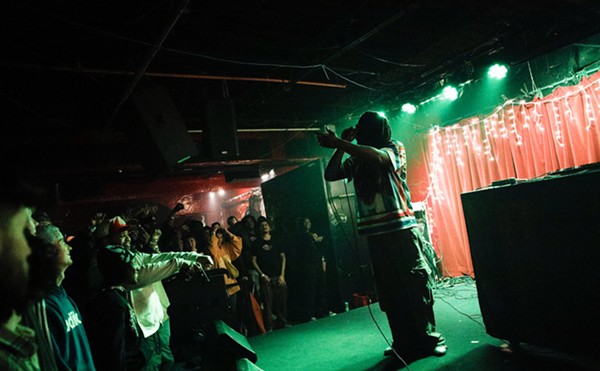"I've changed a lot as a person since I was 18," says singer-guitarist Ani DiFranco via phone from her New Orleans home as she reflects on her career that stretches back decades. "I was doing an interview the other day on the phone with someone who had interviewed me 20 years ago. He said, 'Wow. You're so much more relaxed.' I said, 'That's good. It's been 20 years. Hopefully, I've chilled out at least.'"
DiFranco, an independent artist who cut her musical teeth on the coffeehouse circuit before graduating to theaters and small clubs, started Righteous Babe records and never acquiesced when the major labels knocked on her door in the '90s. Her audience broadened exponentially when she hit the folk festival circuit in the early '90s and then "crossed over to other awareness."
"That's still my family," she says in reference to the folk background. "In terms of the music evolving, there have been many incarnations along the way, species that were invented and then went extinct along the way."
All the while, she's been revered as an artist whose fierce DIY approach and independent attitude have made her a singular entity in the music world.
"I was on the forefront of what's now the main standard of trying to make a career in music in the modern world," she says. "I'm put in that position and that's cool. One of the things that I enjoy about my example is that I built my indie girl U.S. career pre-Internet. I have to specify that. Oddly, Righteous Babe Records were the last people to get a website. We got a website in 2000. The way I built my audience was by hoofing it around the country and playing every backwoods bar. I enjoy that aspect because the Internet and all these new technologies provide great opportunities. But you don't need it. I did the old-fashioned way of just leaving your own damn house and not coming back home again. That still works."
About the time she released 1995's Not a Pretty Girl, DiFranco was on the cover of every major music magazine. She was heralded not only for becoming successful without pandering to commercial radio or MTV but also for running her own label and keeping a large share of the profits for herself — all of which suggested that, if only every label were like her Righteous Babe and every artist like DiFranco, the recording industry would be a kinder, gentler place.
She moved to New Orleans about 10 years ago to be with her husband, producer Mike Napolitano. They started a family and DiFranco took a break from her relentless pace of releasing an album a year and touring extensively in support of it.
"I moved here to be with my now-husband who's a New Orleanian," she explains. "It came with a lot of changes and they're all interconnected. It's hard to extricate it all. The whole thing marked a downshift in my body and my spinning mind. I was a frantic New Yorker most of my life. I grew up in Buffalo, but I moved to New York when I was 18. I was much more high strung. It allowed me to take it down a notch and slow down and chill out. Things here move with a greasy, easy pace. You can hear it on my new record. There's a more relaxed woman singing, which is easier for a lot of people to hear. It's the beginning of a new era for me."
The "new album" to which she refers is the excellent Allergic to Water, which she recorded in two four-day sessions in her New Orleans home.
"Unfortunately, that's the way records are made these days," she says when asked about the recording process. "The days of getting a big advance and going into a studio for a month and exploring and inventing and reinventing things is kind of over. Even though I record at home, it's still quite a big and expensive endeavor to get a recording session. It necessitates knowing what the hell you're doing, which we do. I recorded with my touring band. After that, there's a lot of stepping back and going, 'Is that good or bad? Is it too big or too small? Should I have played zither?' With this record we did one session and then a year later did another session. We thought, 'That song should be a little more blue or a little more green.' Really, it's about making it happen in the space of a few days and then honing it at a leisurely pace afterwards."
The album starts with the decidedly funky "Dithering" and then delivers a set of satisfying songs that allude to the ways in which the once outspoken DiFranco has chilled out and settled into a good groove. A song about how the thing we need can sometimes be the most difficult thing to obtain and sustain, the title track stemmed from a casual conversation she had with some friends.
"The song itself started with a conversation with my friends and we were talking about pollution and how there are so many people with so many allergies these days," she says. "One of my friends said, 'Have you heard of people who are allergic to water?' I thought it was ridiculous. I never did Google my way to whatever information you could find. Instead, my poet brain started riffing on the concept. It did start with a literal conversation, but for my poet brain it had so many different implications."
The album also sounds like an album by a band rather than an individual.
"[Bassist] Todd [Sickafoose] is somebody I feel incredibly kindred with. He's my musical family. [Drummer] Terence [Higgins] I've only been playing with for a couple of years. But this version of an Ani D band is my favorite. Playing with the two of them, I feel like we can go a long way with this. Me and Terence have only begun to deepen in our vocabulary. I really feel excited about my band these days and I'm glad that's the way it comes across because that's the way I feel it."
DiFranco has been a mother for a few years now. So has it gotten easier to balance family and work?
"Well, with the first kid, who's now turning 8, I brought her on the road and toured with her for three and a half years until she went to school," she says. "There was that era. That was cool and exhausting. It's a luxury that not many parents have — taking your kids to work."
Things didn't go as smoothly with her second child.
"This new kid, I tried taking him on the road and it was mayhem," she says. "All those questions I get asked about how I balance work and life needed a new answer. It's easy, depending on the kid. I thought I was a genius with the first one. So then, I took him on three or four tours. I started this new era of leaving my whole family behind. It's emotionally hard especially for the young baby and me. But it's also incredible because I go on tour and it's like a vacation because I don't have two kids in my face. I can write and read and play guitar and engage wholly with my work once again, which I haven't done in years. It's been thrilling for me to go on tour and get deep into music again."












